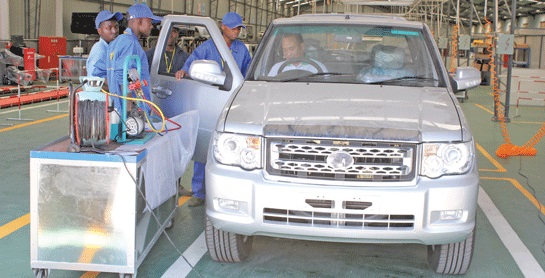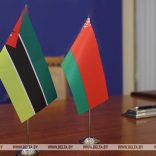Belarus’ commodity exchange to cooperate with Mozambique Commodity Exchange
Industry: From assembling to repair Matchedje Motors reinvents itself to save jobs

Jornal Domingo
Short-term factors such as metical-dollar exchange rate fluctuation caused Matchedje Motors to stop the assembling vehicles. The company, which has been in the Mozambican market for about five years, also complains about the lack of skilled labour.
Matchedje Motors “threw in the towel” and started doing the work of a regular workshop, repairing cars of various brands and origins and buses belonging to the municipalities of Maputo and Matola.
When Matchedje opened up in Machava-sede, Maputo province, it was meant to assemble various vehicles, especially minibuses and bakkies, and repair services would be of secondary importance.
But after five years, the company has given up its main activity to dedicate itself to the repairs. Domingo witnessed its seven workshops equipped for the assembly of vehicles; all were closed.
Cao Hong Lu, chairman of the company’s Board of Directors (PCA), says that the company has established itself in Mozambique full of ambition but had encountered difficulties ranging from the lack of skilled labour to the permanent need to import every kind of work material, making the final price of the cars very high.
Also Read: Matchedje Motors lays off 20 out of 60 workers in Mozambique

This combination of factors meant that the cars produced by Matchedje Motor were unable to compete in price with those imported from Japan, mainly because most of the potential buyers have limited financial capacity, only allowing them to buy the used cars which abound in the domestic.
“Even with our presence, used cars continue to be imported and are a good option for those we had hoped would become our customers, such as families and companies and a sizeable part of the private sector,” he says.
Likewise, Cao Hong said that his company had also placed its hope in state institutions that make acquisitions, but these always observe the lowest price criterion.
He said that the company then put installed internal capacity to produce all the necessary parts for the assembly of vehicles but soon realised that Mozambique did not have labour capable of operating the production equipment.
“To produce here you need to have qualified personnel to respond to market demands throughout the production line, including in the construction of engines. As we do not have qualified technicians, we went back to the importing parts”.
To address the lack of qualified staff, the company offered its 50 workers specialised training, but many gave up, because the company was not in a position to operationalise the equipment for lack of raw material.
Also Read: Matchedje Motors donates four vehicles to Maputo police
Production stimulus
According to the Matchedje Motor chairman, Mozambique could produce more than half of what it imports and be self-sufficient, but the main constraint is the prevailing opening to imports, which undermines domestic and foreign investment initiatives.
For Cao Hong, “it does not make sense that imported products continue to be cheaper even after they are subject to customs duties. This just stimulates the appetite for imported products”.
Cao Hong sites frozen chicken took as an example. Even after duty, it is cheaper than local chicken, which means that poultry farmers can’t compete.
“Increases in customs duty will encourage producers to increase output, because they will have a market. If it were possible to solve the problem of the state budget deficit, the prices would be accessible for all,” he stresses.
Also Read: Government approves import duty hike for used cars – Mozambique
To address the situation, Cao Hong Lu argues that customs duties must be raised, first to discourage imports and second to stimulate local production of goods and services. “Excessive imports damage the economy,” he says.
If rates were raised, Mozambican entrepreneurs would produce more. “We are interested in being part of the process of growth of this economy and we have the capacity to do so, but we think that there should be greater coordination to overcome this problem,” he said.
Also Read: Mozambique: Used car dealers slam import duty hike
Also Read: Govt approves major changes in import customs duties rates – Mozambique
From assembling to repair
Unable to carry out its primary activity and to avoid laying off workers, Matchedje Motor has been selected to repair buses of the municipal public transport companies of Maputo and Matola.
The arrangement is for the car manufacturer to rebuild the first batch of buses within a period of nine months, starting with vehicles with permanent failures, irrespective of whether these are serious or simple. “We want buses to start moving again as soon as possible to minimise the transport crisis affecting Maputo and Matola,” Cao Hong Lu says.
Cao Hong Lu says company is looking into the possibility of repairing buses from other municipalities and also from private sector companies. “We want to see if things get better – if we can find the incentive to expand to the whole country.”
One of the company’s selling points is that it can work with several brands. “But we need money to make the orders we have on hand because we know the two municipal companies have no funds.”
Difficulties
The Matchedje Motors’ manager says that the financial crisis in the country sometimes makes him regret his decision to invest in Mozambique, but he believes that the situation will be overcome soon, taking into account the signs that the economy is beginning to show.
He also believes that Mozambique needs to slim down its bureaucracy to make the business environment healthier, more competitive, and more attractive to investors.
By Angelina Mahumane












Leave a Reply
Be the First to Comment!
You must be logged in to post a comment.
You must be logged in to post a comment.